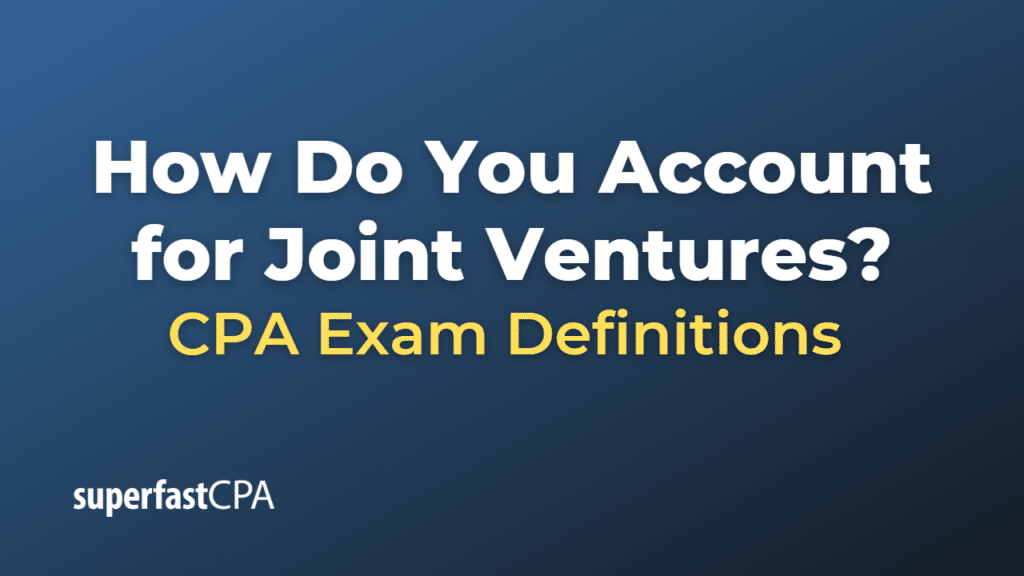How Do You Account for Joint Ventures
The accounting for a joint venture can be somewhat complex and varies depending on the nature of the arrangement and the accounting standards being used. The following are common methods used for joint venture accounting:
- Equity Method: If a company has significant influence over the joint venture but doesn’t have full control (often characterized by owning 20-50% of the joint venture), it will typically use the equity method of accounting. In this method, the initial investment is recorded as an asset on the balance sheet, and this investment is increased or decreased annually to account for the investing company’s share of the joint venture’s profits or losses, which are recognized on the investing company’s income statement.
- Proportional Consolidation Method: This method involves adding together a proportionate share of each of the joint venture’s assets, liabilities, income and expenses with similar items in the venturer’s financial statements. This method was commonly used but its usage is now discouraged or prohibited by many accounting standard bodies including IFRS and US GAAP.
- Consolidation : If a company has control over the joint venture (typically by owning more than 50% of the voting stock), it will generally consolidate the joint venture’s financial statements with its own. This involves combining all of the assets, liabilities, revenue, and expenses of the parent company and the joint venture. However, a portion of the equity and net income attributable to the non-controlling interest (the portion of the joint venture owned by others) is separately presented.
- Line by Line Reporting : In some cases, a company may report its proportionate share of each line item of the joint venture (assets, liabilities, revenues, and expenses) on its own financial statements.
In any case, it is important to ensure the method chosen complies with the applicable accounting standards and truly reflects the substance of the joint venture arrangement. It’s always advisable to seek the assistance of an accountant or auditor when accounting for joint ventures.
You should also be aware that the International Financial Reporting Standards (IFRS) now require the use of the equity method for joint ventures, and no longer permit proportional consolidation. If you’re using US Generally Accepted Accounting Principles (GAAP), you should consult the latest regulations.
Example of How to Account for Joint Ventures
Let’s say we have two companies, TechCo and DistriCo, that form a joint venture, JVco, to manufacture and distribute a new tech gadget in a new market. For simplicity, let’s assume both companies have an equal stake (50/50) in the joint venture.
To begin, both TechCo and DistriCo would record their initial investment in JVco as an asset on their balance sheets. This might include cash, intellectual property, or other assets they contribute to JVco. The investment would be recorded at cost.
Now let’s assume that at the end of the first year, JVco reports a net income of $1 million. Since TechCo and DistriCo each own 50% of JVco, they each have a claim to 50% of the net income, or $500,000.
Under the equity method of accounting, each of TechCo and DistriCo would:
- Increase the carrying amount of their investment in JVco by their share of the net income. So, each would add $500,000 to the investment in JVco asset on their balance sheets.
- Record their share of the net income as income on their income statements. This would increase their net income by $500,000.
If JVco pays dividends to TechCo and DistriCo, the companies would decrease the carrying amount of their investment in JVco by the amount of the dividends received.
Should JVco report a loss in a subsequent year, the process would work in reverse. TechCo and DistriCo would decrease the carrying amount of their investment in JVco by their share of the loss and record the loss on their income statements.
Again, this is a simplified example. Actual accounting for joint ventures can be quite complex and depends on the specifics of the joint venture agreement, the nature of the assets and liabilities involved, and the applicable accounting standards. Always consult with an accounting professional when accounting for joint ventures.













